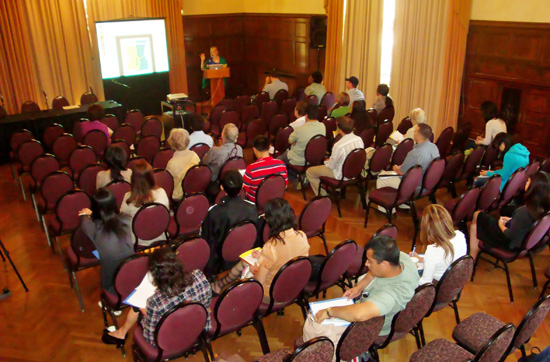Correction: The original version of this article published on August 16 contained an error. The graduate students who attended the conference are pursuing degrees in applied linguistics.
A veteran teacher of students who are English language learners in Arizona was stunned when a state monitor came into her classroom to audit her teaching.
The reason, Christina Parsons told CNN, was because she spoke with an accent. In the state’s view, the Brazil native’s pronunciation potentially set a bad example for students learning English as a second language.
But some academics say the accent isn’t the issue, and the audits were a driving force behind “Linguistic Diversity in American Classrooms: Perspectives on Grammar, Accent, and Fluency,” a conference that took place from Aug. 14 to 15 in Kerckhoff Grand Salon.
Scholars, administrators, teachers, analysts and students from the U.S., Canada and Mexico converged on UCLA to discuss grammar, accents and language “correctness.”
“It sounds like a common thing ““ of course the (Arizona Department of Education) wants people who speak English (well),” said Uju Anya, conference vice chair and graduate student working toward a doctorate in applied linguistics.
“And we think English instructors should have excellent English skills. The problem is how you evaluate who is speaking well and who isn’t, and according to what parameters and standards.”
An Arizona Department of Education spokesperson could not be reached for comment, but department officials told conference vice chair and applied linguistics doctoral student Netta Avineri the policy is targeting competence and grammar, not accents.
Avineri disagreed. But even so, the conference was not intended to point fingers at Arizona’s politics, she added.
“(We want to) use what they’re doing as a starting point for a discussion about race, ethnicity and linguistic diversity more broadly,” Avineri said.
Presentations and panels took place on a variety of topics, from language perceptions and discrimination in the U.S. to a language and citizenship perspective from Germany. Saturday’s keynote speaker John Baugh, a professor from Washington University in St. Louis, discussed his most recent study, which concluded that Latinas were negatively judged based on accent.
A representative from the Arizona Department of Education was invited to the conference but was unable to attend, Anya said. An educator from an Arizona high school served on one of the discussion panels, however, and Northern Arizona University Professor Mary McGroarty presented her research on language policy around the country.
The public event also invited community members to make firsthand testimonials on the topic of linguistic diversity.
The controversy goes back to April, when the Wall Street Journal reported that the Arizona Department of Education had begun to tell school districts to remove teachers with “heavily accented” English from classes with ELL.
While no teachers have yet been fired or reassigned, the article caused an outcry, especially in the academic community.
The University of Arizona, Stanford University, the Linguistic Society of America and the National Council of Teachers of English all issued statements condemning the policy.
“Having an “˜accent’ does not determine one’s ability to teach the target audience well,” said Lauren Mason Carris, vice chair of the conference and a graduate student in applied linguistics.
An Arizona Department of Education spokesperson could not be reached for comment, but conference organizers said the policy was part of the state’s effort to comply with fluency standards in the No Child Left Behind law. Audits have been taking place since 2006, Anya said.
Though the policy is not in written form, teachers with accents have been monitored differently, Avineri said.
Avineri was in contact with policymakers in Arizona in the months preceding the conference. She said that the policy of removing or reassigning ELL teachers with accents is being discussed but has not yet been enacted.
“As far as I understand, at this point it’s a plan for the future,” Avineri said. “But the backlash response to what the Wall Street Journal said (seems to be) putting it on pause.”
Avineri said the written responses from universities have contributed to mounting backlash. But she and her colleagues decided to go a step further.
“We originally planned to put out a statement similar to the others, but decided it would be even better to organize a conference to discuss these issues and have a dialogue,” Avineri said. She said the conference was likely the first of its kind.
On a broader level, the conference organizers aimed to make a statement about integrating research into political action.
“As a goal, we would like there to be really sound, research-based policies being enacted,” Avineri said.
